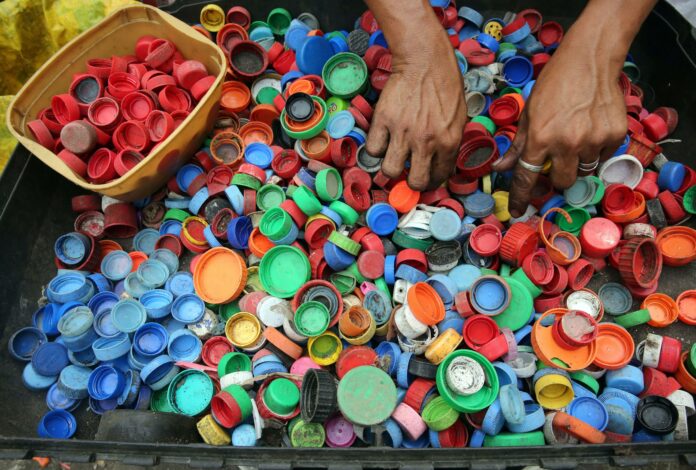Recycling businesses and green startups play an important role in reducing waste, conserving natural resources, and promoting innovative environmental solutions.
In this blog post, we’ll look at the top ten recycling business ideas, as well as the advantages of green business systems and the impact of green startups in the United States. This post will provide valuable insights into the growing green industry, whether you’re an entrepreneur or simply interested in learning more about sustainability.
Recycling Business Ideas
1. E-waste recycling business
As technology advances, electronic waste (e-waste) has become a growing global problem. Electronic devices such as computers, smartphones, and televisions are examples of e-waste. These devices contain hazardous materials that, if not properly disposed of, can be hazardous to human health and the environment. As a result, e-waste recycling has emerged as an important component of the recycling industry.
The e-waste recycling industry is expanding as more devices are manufactured and discarded each year. This provides an opportunity for entrepreneurs to launch e-waste recycling businesses and capitalize on this expanding market.
Consumers, businesses, and government entities are all potential customers for e-waste recycling businesses. Consumers frequently have old electronic devices that they no longer need or want to dispose of, whereas businesses and government entities may have larger amounts of e-waste as a result of equipment upgrades or replacements. Furthermore, businesses and government entities with sustainability goals are increasing their demand for certified e-waste recycling services.
2. Paper recycling business
The process of converting waste paper into new paper products is known as paper recycling. This is accomplished by collecting used paper, sorting it, and converting it into pulp that can be used to create new paper products. Paper recycling is an important part of the overall recycling industry and is necessary for environmental sustainability.
The paper recycling industry has been around for a long time and has grown significantly over that time. Paper recycling is typically classified into three major categories: collection, processing, and manufacturing.
Consumers frequently have paper waste to dispose of, such as newspapers, magazines, and cardboard boxes. Because of the nature of their operations, such as offices or packaging facilities, businesses may generate more paper waste. Additionally, as part of their sustainability goals, government entities may require paper recycling services.
3. Plastic recycling business
Plastic recycling is the process of reusing plastic waste to create new plastic products. Plastic Recycling Market Size was valued at USD 38.51 billion in 2021. The plastic recycling market industry is projected to grow from USD 41.24 Billion in 2022 to USD 66.66 billion by 2030. Plastic recycling is an important component of the overall recycling industry and is necessary for environmental sustainability. Starting a plastic recycling business can be a profitable venture that also has the potential to benefit the environment.
As plastic waste has become a major environmental problem, the plastic recycling industry has grown significantly over the years. The plastic recycling industry is typically divided into three main categories: collection, processing, and manufacturing.
Plastic waste, such as plastic bottles, bags, and containers, is frequently discarded by consumers. Because of the nature of their operations, such as packaging or manufacturing facilities, businesses may generate more plastic waste. Furthermore, as part of their sustainability goals, government entities may require plastic recycling services.
4. Glass recycling business
Glass recycling is the collection, sorting, and conversion of waste glass into usable products. Glass recycling is an important component of the overall recycling industry and is critical to environmental sustainability. Starting a glass recycling business can be a profitable venture that also has the potential to benefit the environment.
The glass recycling industry has been around for a long time and has grown significantly over that time. Glass recycling is typically classified into three major categories: collection, processing, and manufacturing.
Consumers, businesses, and government entities are all potential markets for glass recycling businesses. Glass waste, such as glass bottles and jars, is frequently discarded by consumers. Businesses, such as restaurants or manufacturing plants, may generate a greater volume of glass waste due to the nature of their operations. Additionally, as part of their sustainability goals, government entities may require glass recycling services.
Glass recycling companies can sell their products to a variety of industries, including glass container manufacturing, construction, and art and craft. As more businesses seek ways to reduce their environmental impact and meet sustainability goals, the demand for recycled glass products is increasing.
5. Metal recycling company
Metal recycling is the process of reusing scrap metal to create new products. Metal recycling is an important component of the overall recycling industry and is necessary for environmental sustainability. Starting a metal recycling business can be a profitable venture that also has the potential to benefit the environment.
Metal recycling is a mature and well-established industry that has been around for a long time. Metal recycling is typically divided into two categories: ferrous metals (which contain iron) and non-ferrous metals (not containing iron).
Metal recycling companies can sell their wares to a variety of industries, including construction, automotive, and manufacturing. As more businesses seek ways to reduce their environmental impact and meet sustainability goals, the demand for recycled metal products is increasing.
6. Textile recycling enterprise
The process of converting old, used, or unwanted clothing and textiles into new products is known as textile recycling. Textile recycling is an important part of the overall recycling industry and is necessary for environmental sustainability. Starting a textile recycling business can be a profitable venture and has the potential to make a positive impact on the environment.
In comparison to other recycling industries, the textile recycling industry is relatively new. According to the Environmental Protection Agency (EPA), textiles accounted for approximately 7.6% of all landfill waste in 2018. This presents an excellent opportunity for entrepreneurs to launch textile recycling businesses and capitalize on this expanding market. Pre-consumer and post-consumer textile recycling are the two main categories in the textile recycling industry.
Consumers, businesses, and government entities are all potential markets for textile recycling businesses. Customers frequently have used clothing that they want to get rid of or donate. Textile waste may be generated by businesses due to the nature of their operations, such as textile manufacturing facilities or retail stores. Furthermore, government entities may require textile recycling services as part of their sustainability goals.
7. Battery recycling business
Battery recycling is the process of recovering valuable materials from used batteries to create new products. The battery recycling industry is a critical component of the overall recycling industry and is critical for environmental sustainability. Starting a battery recycling business can be a profitable venture that also has the potential to benefit the environment.
The battery recycling industry is small in comparison to other recycling industries, but it is expanding as battery demand rises. According to an International Energy Agency (IEA) report, global battery demand is expected to rise significantly in the coming years, resulting in increased battery waste. This presents an excellent opportunity for entrepreneurs to launch battery recycling businesses and capitalize on this expanding market.
8. Organic waste recycling business
Organic waste recycling is the process of converting organic waste materials into useful products such as compost, biogas, and fertilizer. Organic waste recycling companies are growing in popularity as more businesses and individuals seek ways to reduce their environmental impact and meet sustainability goals. Starting an organic waste recycling business can be a profitable venture that also has the potential to benefit the environment.
Organic waste recycling is a rapidly expanding subset of the overall recycling industry. According to an Environmental Protection Agency (EPA) report, food waste accounted for nearly 22% of all landfill waste in 2018. This presents an excellent opportunity for entrepreneurs to launch organic waste recycling businesses and capitalize on this expanding market. The organic waste recycling industry is typically classified into two types: industrial and municipal.
Organic waste recycling services may be of interest to businesses that generate large amounts of organic waste, such as restaurants and grocery stores. Organic waste recycling may be required by municipalities as part of their sustainability goals and waste management programs. Individuals who compost at home may also be interested in purchasing compost or fertilizer products from organic waste recycling companies.
9. Composting business
Composting is the process of converting organic materials such as food scraps and yard waste into a nutrient-rich soil amendment suitable for gardening and landscaping. Composting businesses are growing in popularity as more people and businesses seek ways to reduce their environmental impact and improve soil health. Starting a composting business can be a profitable venture that also has the potential to benefit the environment.
Individuals, businesses, and municipalities are all potential customers for composting businesses. Composting enthusiasts may be interested in purchasing composting supplies or finished compost from composting companies. Composting services may be of interest to businesses that generate large amounts of organic waste, such as restaurants and grocery stores. Composting may be required by municipalities as part of their waste management programs.
10. Tyre recycling business
Tyre recycling is the process of converting waste tyres into valuable materials for use in a variety of applications such as construction, fuel, and manufacturing. Tyre recycling businesses are becoming increasingly important as people become more environmentally conscious and strive to reduce their waste. Starting a tyre recycling business can be a profitable venture that also has the potential to benefit the environment.
The tyre recycling industry is a rapidly growing subset of the recycling industry as a whole. According to a World Business Council for Sustainable Development report, over one billion tyres are produced worldwide each year, with approximately half of these ending up in landfills or illegally dumped. This presents a significant opportunity for entrepreneurs to launch tyre recycling businesses and capitalize on this expanding market. Collection and transportation, shredding and grinding, and processing and refining are the three main processes in the tyre recycling industry.
Manufacturers may be interested in acquiring recycled tyre materials for use in products such as rubber flooring or roofing. Recycled tyre materials may be of interest to construction companies for use in road construction or as a base layer for building foundations. People may be interested in buying recycled tyre products like rubber mulch for their gardens.
Green Business Systems
Green business systems are long-term business practices that encourage environmental and social responsibility. These systems are designed to reduce the environmental impact of business operations while increasing efficiency and lowering costs. Implementing green business systems has the advantages of reducing waste, conserving natural resources, and improving the company’s reputation among customers, employees, and stakeholders.
Green Certifications
Green certifications are third-party certifications that verify a company’s sustainability efforts and demonstrate their commitment to environmental stewardship. As consumers and businesses alike seek ways to reduce their environmental impact, these certifications are becoming increasingly important in the recycling industry. LEED (Leadership in Energy and Environmental Design), Green Seal, and ENERGY STAR are three popular green certifications in the United States.
Green Business Systems in the United States
The United States has a well-developed network of green businesses and sustainability initiatives. Many businesses are implementing green business systems and adopting sustainable practices to reduce their environmental impact while increasing their bottom line. Some businesses, for example, are implementing energy-efficient lighting and HVAC systems, as well as renewable energy sources and waste reduction programs. Furthermore, many government programs and incentives, such as tax credits and grants, are available to businesses that implement green business systems.
Green Startups
In their operations, green startups prioritize environmental sustainability and social responsibility. These companies want to reduce their environmental impact, conserve natural resources, and promote a more sustainable future. Green startups can have a significant environmental impact because they frequently introduce innovative solutions to environmental problems.
Green Startups Funding Options
Green startups have several funding options to help them get started and grow. Angel investors, venture capital, crowdfunding, and grants from government or non-profit organizations are all popular sources of funding. Many investors and funding organizations are interested in green startups because they have the potential to provide social and environmental benefits in addition to financial returns.
Successful Green Startups in the United States
Many successful green startups have emerged in the United States in recent years. Tesla, a company that manufactures electric vehicles and renewable energy solutions, and Beyond Meat, a company that manufactures plant-based meat alternatives, are two examples. Other successful green startups in the United States include Recycle Track Systems, which provides waste and recycling management solutions, and Inspire, which provides residential customers with clean energy plans.
Start your own Recycling Company
It is critical to have a solid business plan in place as you investigate recycling business ideas and consider starting your own sustainable venture. At Startup Stunners, we specialize in crafting customized business plans that are tailored to your specific goals and needs.
From market research and financial projections to funding and operations, our team of experienced writers and consultants can guide you through the process of starting a recycling business or green startup. You’ll have the confidence and clarity you need to take your sustainable business idea to the next level with our business plan writing services. Contact us today to learn more!
Conclusion
Finally, recycling businesses and green startups are becoming increasingly important in promoting sustainability and environmental stewardship. These businesses are helping to create a more sustainable future for future generations by reducing waste, conserving natural resources, and introducing innovative solutions.
The United States has a thriving network of green businesses and sustainability initiatives, with numerous government programs and incentives to help them succeed. The potential for success in these sectors is significant, given the continued growth of the green industry and rising consumer demand for sustainable products and services. Companies that prioritize sustainability in their business practices can not only benefit the environment, but also increase efficiency and reduce costs, resulting in a more prosperous and sustainable future.
Frequently Asked Questions
What is a green industry?
A green industry is one that prioritizes environmental sustainability and social responsibility in its operations. These companies want to reduce waste, save natural resources, and promote a more sustainable future.
What are green business systems?
Green business systems are long-term business practices that encourage environmental and social responsibility. These systems are designed to reduce the environmental impact of business operations while increasing efficiency and lowering costs.
What are green startups?
A green startup is a company that prioritizes environmental sustainability and social responsibility in its operations. These companies want to reduce their environmental impact, conserve natural resources, and promote a more sustainable future.
What are some examples of recycling businesses?
E-waste recycling, paper recycling, plastic recycling, glass recycling, metal recycling, textile recycling, battery recycling, organic waste recycling, and tyre recycling are some examples of recycling businesses.
How can I start a recycling business?
Typically, starting a recycling business entails researching the industry and potential markets, creating a business plan, obtaining funding, and obtaining any required licenses and permits. The specific steps will vary depending on the type of recycling business you want to start.






